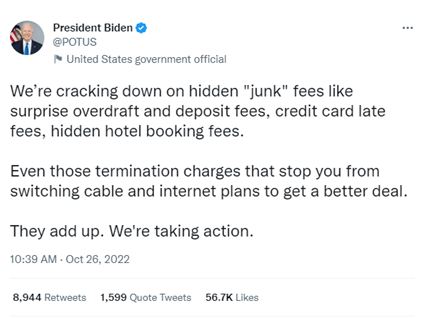Resort and amenity fees have long been common practice throughout the hospitality industry, first emerging in the late 1990s. The FTC reports that by 2015, hospitality fees accounted for one-sixth of total revenue in the sector, or almost $2 billion per year. The advent of these fees may trace back to the sudden emergence of online travel agents and online platforms to offer competitive rates to consumers. The consumer clicks on an attractive rate, then is committed to completing the transaction even when the subsequent screens disclose the resort fee and taxes.
More recently, these hospitality fees have come under additional scrutiny, due in part to the scale and prevalence of the fees in the leisure travel and vacation rental sector. Fueled by viral social media campaigns, articles circulated images of charges levied on guests that sometimes doubled or tripled the promised rental rate. In the current era of social media and political populism, this industry practice attracted greater regulatory scrutiny.
On October 26, 2022, President Biden issued a tweet from the official POTUS account that read:

Concurrently with the tweet, the administration issued a formal statement of its intent to address what it called the many "junk fees" or "drip fees" and other pricing practices from banks, airlines, ticketing sources, and hotels. The Consumer Financial Protection Bureau also announced it was taking action to eliminate hidden fees in the banking sector.
The FTC has been tasked with issuing regulations to address so-called junk fees and hidden fees and is likely to be the entity enforcing these rules on behalf of consumers. In 2017, the FTC published an Economic Analysis of Hotel Resort Fees. On November 8, 2022, the FTC published advance notice of proposed rulemaking (ANPR) under the Federal Trade Commission Act (FTC Act). This authority permits the FTC to promulgate, modify, and repeal trade regulation rules that define, with specificity, acts or practices that are unfair or deceptive in or affecting commerce within the meaning of Section 5(a)(1) of the FTC Act, 15 U.S.C. 45(a)(1). The ANPR cites to its Economic Analysis, complaining that resort fees that are mandatory and undisclosed artificially increase search costs and cognitive costs, forcing consumers to pay as much as 20% more than the upfront disclosed price.
The FTC also complains that hotels can raise prices by raising resort fees without raising the underlying room rate. The FTC rails against the practice of drip pricing, which it defines as "the practice of advertising only part of a product's price upfront and revealing additional charges later as consumers go through the buying process.'' The ANPR announces the FTC's position that actions by other regulatory agencies, such as state attorneys general, have not been effective against the practices described in the ANPR.
The FTC has invited comment and feedback from the public and pertinent industries, specifically seeking comment on "the costs and benefits of a rule that would require upfront inclusion of any mandatory fees whenever consumers are quoted a price for a good or service and other potential rule requirements to curtail unfair or deceptive fees, and alternative or additional action to such a rulemaking."
The deadline to submit comments to the FTC is January 9, 2023. If you would like to make your positions known on the topic, we encourage you to prepare and file a statement, or contact our office about having a statement prepared on your behalf.
If you have questions about this or any other hospitality-related issues, please contact Joel Buckberg, Jason Bloom, Laura Layton, or your Baker Donelson attorney.